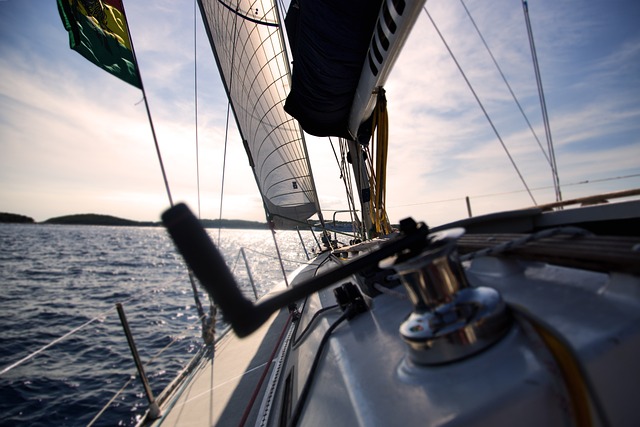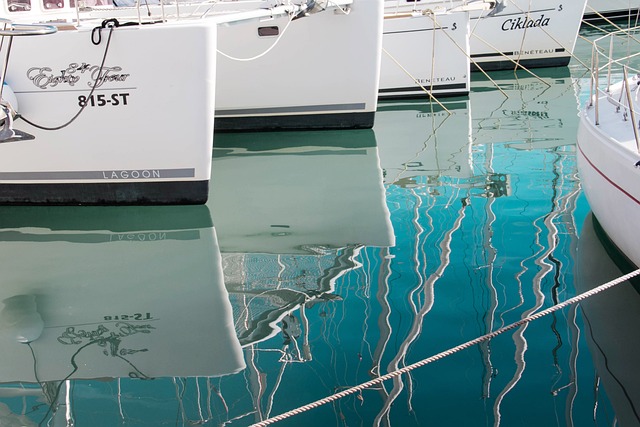Marine batteries have a unique set of challenges due to their exposure to saltwater environments, which can lead to premature degradation. To ensure these batteries last as long as possible, it's essential to maintain them properly by regularly cleaning terminals and connectors to prevent corrosion, inspecting for physical damage, and topping off electrolyte levels with distilled water. Desalination or freshwater rinses after saltwater exposure are also beneficial. Employing insulators and anti-corrosion treatments can protect the battery's terminals, while storing the battery in a dry place when not in use helps prevent damage. It's crucial to follow the manufacturer's recommendations for charging and to be aware of temperature extremes that can affect performance. By implementing these maintenance strategies, marine battery users can extend their operational lifespan significantly.
Marine batteries are critical components for nautical endeavors, yet their lifespans can be markedly shorter than their land-based counterparts due to the corrosive effects of saltwater. This article delves into the mechanisms behind the accelerated degradation of marine batteries when immersed in briny environments, exploring factors such as corrosion, chemical reactions, and design considerations that impact performance. From the detrimental effects of sulfation to the disruption of electrolyte balance, understand how saltwater not only affects the battery’s terminals but also influences its overall longevity. We will also examine strategies for maintenance and protective measures to extend the operational life of marine batteries, ensuring your onboard power sources endure the high-salinity conditions they face at sea.
- Understanding Marine Batteries: The Role of Corrosion and Salinity
- Saltwater's Impact on Marine Battery Performance: A Chemical Analysis
- The Enemy Within: How Sulfation Accelerates in Saltwater Environments
- Electrolyte Imbalance: The Science Behind Saltwater Intrusion
- Design Flaws and Marine Battery Longevity: What Manufacturers Miss
- The Corrosion Conundrum: Protective Measures for Marine Battery Terminals
- Temperature Extremes and Their Effects on Marine Battery Life
- Maintenance Strategies to Mitigate Saltwater Degradation in Marine Batteries
Understanding Marine Batteries: The Role of Corrosion and Salinity

Marine batteries, distinct from their land-based counterparts, are subject to a unique set of environmental challenges that can lead to accelerated degradation when immersed in saltwater environments. These batteries, often lead-acid or AGM (Absorbent Glass Mat) types, are particularly susceptible to the corrosive effects of saltwater and its components. The salinity present in marine conditions can cause a phenomenon known as ‘plate sulfation,’ where the active lead plates within the battery react with the salt to form an insulating layer of lead sulfate. This reaction reduces the surface area available for electrolyte interaction, thereby diminishing the battery’s ability to hold a charge over time.
Furthermore, the salinity and humid conditions found in marine settings promote corrosion on both the external and internal surfaces of the battery. Corrosion can lead to short circuits and hinder the battery’s efficiency by impeding the flow of electrical current. The presence of chloride ions in saltwater accelerates this corrosive process, particularly at terminals, connectors, and other metal components. It is crucial for mariners to maintain their batteries with regular cleaning, proper ventilation, and timely inspections to mitigate the effects of salinity and ensure optimal performance. Regular maintenance includes removing corrosion from terminals, ensuring connections are secure and free from oxidation, and possibly using a desiccant to absorb moisture that can contribute to corrosion and degradation. Understanding these factors is essential for prolonging the lifespan of marine batteries and ensuring their reliability during navigation or when anchored in saltwater environments.
Saltwater's Impact on Marine Battery Performance: A Chemical Analysis

Marine batteries are robust devices designed to withstand the harsh conditions of the marine environment; however, their performance can be significantly impacted by prolonged exposure to saltwater. The electrolyte solution within these batteries is sensitive to chloride ions present in saltwater, which accelerate the corrosion of the lead plates and the grid structure. This corrosion interferes with the battery’s ability to hold a charge, leading to reduced capacity and efficiency over time. The presence of salt also affects the ionic transport between the electrodes, as the high salt concentration can alter the solution’s conductivity and viscosity, further degrading the battery’s performance. Additionally, the hydrogen gas produced during the charging process can mix with oxygen from the air, creating corrosive acids that accelerate the deterioration of the battery’s components. Understanding the chemical reactions that occur between saltwater and the battery’s electrolyte is crucial for optimizing battery lifespan and maintaining optimal performance in marine applications. Regular maintenance, such as topping up with distilled water and cleaning the terminals, can mitigate these effects but cannot entirely prevent the degradation caused by the saline environment.
The Enemy Within: How Sulfation Accelerates in Saltwater Environments

Marine batteries, a critical component for the operation of various maritime systems and recreational activities, often encounter accelerated degradation when exposed to saltwater environments. This phenomenon is primarily attributed to sulfation, a process where sulfur atoms accumulate on the battery’s lead plates. In freshwater conditions, the electrolyte solution can effectively transport sulfate ions away from the lead plates, preventing excessive buildup and enabling the battery to maintain its charge capacity. However, in saltwater, the presence of chloride ions disrupts this process. Chloride ions react with the sulfate ions to form more insoluble compounds, which adhere tenaciously to the lead plates, a condition known as ‘sulfation.’ This reaction creates a compound that is harder to reverse through charging, leading to a significant decrease in battery performance.
The high salinity of seawater not only interferes with the electrochemical reactions within the battery but also corrodes the terminals and connections at a faster rate compared to freshwater conditions. The corrosive nature of saltwater can lead to a loss of electrical conductivity, further exacerbating the already heightened rate of sulfation. This ‘enemy within’ not only compromises the battery’s ability to hold a charge but also shortens its lifespan, making maintenance and regular checks crucial for ensuring optimal performance and reliability in marine applications. Understanding the detrimental effects of saltwater on marine batteries underscores the importance of selecting the appropriate type of battery and employing protective measures when used in these environments.
Electrolyte Imbalance: The Science Behind Saltwater Intrusion

Marine batteries are uniquely susceptible to degradation in saltwater environments due to an electrolyte imbalance that arises from the presence of sodium and chloride ions in seawater. When a marine battery is submerged in saltwater, the salt dissolved in it can penetrate the battery’s lead-acid electrolyte solution. This intrusion leads to an electrolyte imbalance as the high concentration of sodium and chloride ions within the battery mixes with the sulfuric acid electrolyte, altering its composition. The process of ion exchange affects the battery’s ability to hold a charge; specifically, the chloride ions displace the hydrogen ions from the electrolyte, creating a less conductive environment. This change in ion concentration disrupts the chemical reactions essential for the battery’s operation, causing a reduction in efficiency and an increase in corrosion rates of the battery’s internal components. As a result, the battery’s lifespan is significantly shortened, and its performance degrades faster than it would in freshwater or under dry conditions. Understanding this science behind saltwater intrusion is crucial for maintaining the integrity and longevity of marine batteries, ensuring they remain reliable power sources for nautical equipment and vessels. Regular maintenance, such as cleaning the terminals, topping off the electrolyte levels with distilled water, and conducting thorough inspections after exposure to saltwater, can help mitigate the effects of this imbalance and prolong the battery’s lifespan.
Design Flaws and Marine Battery Longevity: What Manufacturers Miss

Marine batteries, distinct in their design from automotive and deep-cycle variants, are often subject to premature degradation when used in saltwater environments. This is primarily due to several inherent design flaws that manufacturers may overlook during the production process. One critical factor is the material composition of the battery’s lead plates; while some are designed with corrosion-resistant coatings, these coatings can be insufficient against the aggressive nature of saltwater. The electrolyte solution within marine batteries reacts adversely with salt, leading to increased corrosion rates on unprotected metal components. This corrosion compromises the battery’s structural integrity and its ability to hold a charge over time, significantly reducing its longevity in the maritime context.
Furthermore, manufacturers often engineer marine batteries with a focus on high amperage for cranking engines, which is essential for their intended use. However, this emphasis sometimes comes at the expense of cycle life and durability when the battery is subjected to the constant and varying demands of long-term use in a saltwater setting. The frequency and depth of discharge cycles in a marine application can lead to accelerated aging if the battery’s construction doesn’t account for these stresses. It’s crucial for manufacturers to design batteries with thicker active plates, more robust separators, and advanced corrosion-resistant technologies to mitigate these issues and enhance the service life of marine batteries in saltwater environments.
The Corrosion Conundrum: Protective Measures for Marine Battery Terminals

Marine batteries are subject to a unique set of challenges in their lifespan due to the harsh conditions of the saltwater environment. One of the primary issues faced by marine batteries is corrosion at the terminals, which can significantly degrade performance and reliability. Saltwater’s inherent corrosive properties accelerate this process, as the electrolyte in the battery reacts with the oxygen and chloride ions present in seawater. This reaction forms a corrosion product on the terminal surfaces, leading to increased resistance and potential connection failures.
To mitigate this issue, it is crucial to implement protective measures for marine battery terminals. The application of specialized corrosion-inhibiting compounds or pastes can form a barrier between the metal and the saltwater, reducing direct contact and slowing down the corrosion process. Regular cleaning and maintenance are also vital; using a wire brush to remove any existing corrosion and applying a coating of petroleum jelly or dielectric grease over the terminals can help preserve their integrity. Additionally, selecting marine batteries with built-in protection against corrosion, such as those with sealed lead-tin (PbSn) alloy grids or stainless steel terminals, can enhance their durability and longevity in saltwater conditions. Regular inspection and maintenance should be a routine part of the upkeep of any marine battery to ensure optimal performance throughout its service life.
Temperature Extremes and Their Effects on Marine Battery Life

Marine batteries are subject to a unique set of environmental challenges, particularly when submerged in saltwater environments. One of the most significant factors affecting marine battery life is temperature extremes. Prolonged exposure to high temperatures can cause the electrolyte within the battery to evaporate more rapidly than usual, leading to a decrease in electrolyte concentration and battery capacity. This phenomenon can result in reduced cranking power and an increased likelihood of the battery failing to start the engine when needed. Conversely, cold temperatures can lead to a viscosity increase in the electrolyte solution, which slows down the chemical reactions necessary for the battery to function optimally. The reduced ion mobility during colder periods can cause a drop in voltage and a diminished ability to hold a charge. Both high and low temperature extremes thus contribute to the degradation of marine batteries over time, necessitating careful monitoring and maintenance to ensure their longevity and reliability on the water. It is imperative for boat owners to consider the thermal conditions their marine batteries will face and take appropriate measures, such as insulation or temperature-controlled battery boxes, to mitigate these effects and protect their investments.
Maintenance Strategies to Mitigate Saltwater Degradation in Marine Batteries

Regular maintenance is critical for extending the lifespan of a marine battery subjected to saltwater environments. To combat the corrosive effects of saltwater on these batteries, it is imperative to implement robust maintenance strategies. Firstly, owners should routinely check and clean the terminals and connectors with a wire brush or terminal cleaning solution to remove any salt or corrosion buildup. This practice not only ensures optimal electrical connections but also prevents corrosive compounds from causing a battery’s internal resistance to increase. Additionally, regular inspections for any signs of physical damage, such as cracks or bulging, are essential to detect early any issues that could compromise the integrity of the battery.
Proactive maintenance involves periodic topping up of the electrolyte levels to maintain proper battery function. It is also advisable to use a desalination device or manually rinse the battery with fresh water after exposure to saltwater, especially if the battery has been submerged or splashed frequently. Employing a battery insulator or using anti-corrosion compounds on terminals can further protect against electrolyte leaks and salt intrusion. Furthermore, storing the battery in a dry place when not in use and choosing a suitable marine battery designed to withstand harsh marine conditions can also mitigate the degradation caused by saltwater exposure. Regular charging practices that adhere to the manufacturer’s recommendations and monitoring the battery’s state of charge will ensure it operates at peak performance, delaying the onset of degradation due to saltwater corrosion.
Marine batteries, integral to the operation of countless vessels, are subject to accelerated degradation in saltwater environments due to a complex interplay of factors. This comprehensive analysis delves into the chemical reactions that facilitate corrosion and salinity’s detrimental effects on battery performance. The increased prevalence of sulfation in saltwater conditions, coupled with electrolyte imbalances caused by salt penetration, significantly shortens their lifespan. Recognizing design flaws that compromise longevity, the article underscores the importance of robust manufacturing standards. It also highlights the necessity for maintaining optimal terminal protection against corrosion and addressing temperature extremes that further diminish battery life. By implementing tailored maintenance strategies, marine battery durability can be enhanced, ensuring reliable power even in the challenging marine environment.
